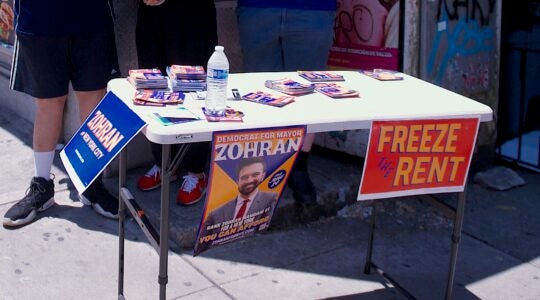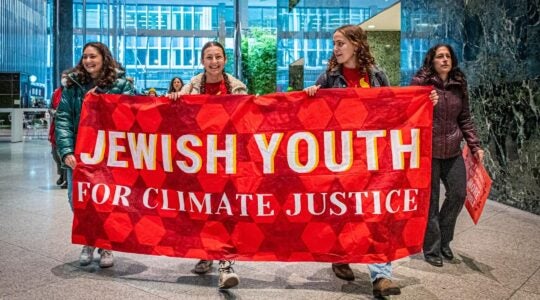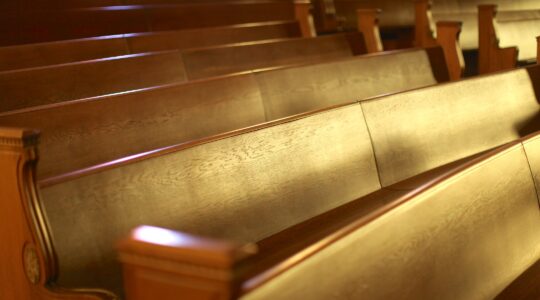We are now immersed in the seven weeks between Tisha B’Av and Rosh Hashanah, known as the Seven weeks of Consolation, carrying us from the lowest point on the Jewish calendar to a time of new beginnings. For those of us who love Israel and believe in preserving its democracy, this is a season of rebuilding hope, of drawing strength from acts of solidarity and protest of thousands of Jewish and Palestinian Israelis throughout Israel protesting the Nation-State law.
The three disturbing events in Israel in the days leading up to Tisha B’Av were a new low point for democracy in Israel: the passage of the Nation-State Law, defining Israel as a singularly Jewish state with no mention of its democratic character, downgrading Arabic from an official language, and enshrining the second-class citizenship of Arab and other non-Jewish citizens of Israel; the exclusion of gay male couples and single men who wish to become parents from a newly passed Surrogacy Law amendment; and the predawn arrest of a Conservative rabbi in Haifa for officiating at a marriage outside of the strictures of the Ultra-Orthodox rabbinate.
None of these events should have been surprising, but each was profoundly painful: after years of unheeded warnings about actions undermining the foundations of Israeli democracy, here were three blows so extreme that even those loathe to criticize Israel couldn’t help see how dire the situation has become.
These three interconnected assaults on freedom and equality were uncomfortable echoes of the Three Weeks of Admonition that precede Tisha B’Av, when we read increasingly desperate pleas from the prophets Jeremiah and Isaiah, warning of the destruction that will befall the Jewish people if they do not change their ways. Isaiah excoriates the people, asserting that their performance of pious acts and religious rites are loathsome and offensive to God unless the people “learn to do good, devote yourselves to justice and aid the wronged.” Couching state-sanctioned discrimination against non-Jewish citizens in language of “preserving the Jewish character of the state” is a contemporary reenactment of the abuse of Jewish values at the expense of justice.
But the story doesn’t end with destruction. Immediately after Tisha B’Av we begin the seven Shabbatot of Consolation. It takes longer to heal after tragedy than for the tragedy to unfold. It takes longer to rebuild a society than for it to be torn down.
Midrash says that it was Tisha B’Av when Moses came down from the mountain with the original Tablets, carved by God, and discovered that the Israelites had lost hope, abandoned their promises, and created the Golden Calf. On Tisha B’Av Moses smashed the tablets. He went back up the mountain on the first day of the month of Elul, and this time had to carve the second set of tablets with his own hand. On Yom Kippur Moses came down the Mountain for the second time, to an Israelite people who had done the excruciatingly hard work of rebuilding themselves and their community.
For the rest of their time in the wilderness the Israelites carried the broken tablets in the ark along with the whole tablets. From then on they always carried the vestiges of those God-carved tablets and the memory of their own failing along with the whole tablets, painfully carved by a chastened leader.
We are approaching Rosh Chodesh Elul, the day, according to Midrash, that Moses ascended the mountain for the second time. Without the luxury of hindsight, we don’t know exactly where we are on the trajectory of Admonition, the Destruction, the Consolation, of the broken and whole Tablets. The tablets on which Israel’s founding promises are carved have been so chipped away by an ultra-right wing government that we risk not noticing when they are being smashed before our eyes. Every piece of legislation that narrows the rights of LGBT people who want to become parents, that threatens the free speech of those who oppose the occupation, that determines whether a person can spend Shabbat at a café or on the beach or only in a synagogue, or which rabbis are allowed to officiate at the weddings of which Jews, that limits the rights of Palestinian Arab citizens of Israel, or erases the promise to shelter refugees, is a hammer smashing the tablets of the founding covenant of Israel as state offering equality for all of its citizens. Each is meant to divide and splinter the community of people who love Israel, who, according to tradition, stood as one at Sinai to form a single, sacred community.
It’s time to take notice.
In our time, we need to admonish and console at the same time. To warn that it might get worse while we are working to build it back up. To carry those broken tablets even as they are being chipped further away, even as we are carving the new tablets.
The groundswell of protests from Israelis of all kinds, in an effort to prevent the Nation-State bill from becoming law and in the days afterward, points the way to the work that we must all do to protect democracy, justice and equality for all Israelis and all who live under Israeli control. Those of us who love Israel must do everything in our power to support these efforts, recalling Isaiah’s words to both comfort Israel and urge them forward: “As eagles grow new plumes: They shall run and not grow weary, They shall march and not grow faint.”
Rabbi Ayelet Cohen is Senior Director of the New Israel Fund in New York and serves on the board of T’ruah, the Rabbinic Call for Human Rights
The New York Jewish Week brings you the stories behind the headlines, keeping you connected to Jewish life in New York. Help sustain the reporting you trust by donating today.




